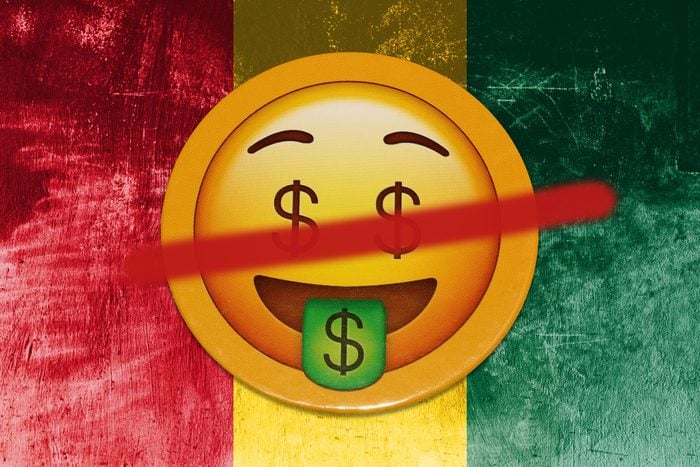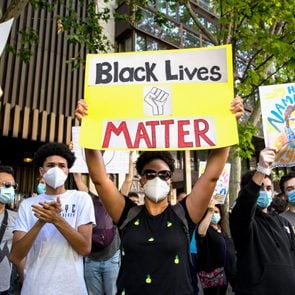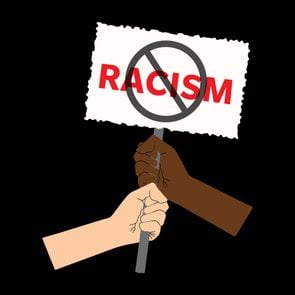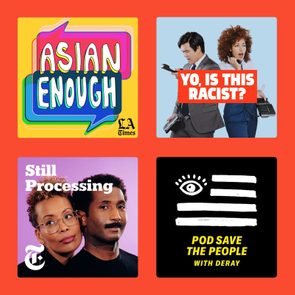Companies Are Trying to Cash In on Juneteenth. Here’s Why That’s a Problem
Updated: Jun. 16, 2023

Big brands are trying to profit off Juneteenth, but that's not what the holiday is about.
On June 19, 1865, more than two years after President Abraham Lincoln signed the Emancipation Proclamation, enslaved Africans in Galveston, Texas, learned they had been set free. They were undoubtedly happy to receive this news about the legal discontinuation of slavery. But what a shame that the news of their freedom was so delayed.
Notwithstanding, Juneteenth became a day of celebration for African Americans in Texas and all across the United States. It predates Black History Month (which began as Negro History Week) and Martin Luther King Jr. Day and is therefore considered the oldest holiday honoring African Americans. Here is one important acknowledgment: It became a holiday because the people from whom it originated deemed it so. And it did not become a federal holiday until 2021.
A holiday grounded in history
There are numerous noteworthy features of Juneteenth celebrations. First is remembering our ancestors, who were violently stolen from their native land, terrorized for hundreds of years, and then eventually set free—even if it took 30 months to deliver the news of freedom to those in Galveston.
Additionally, the Juneteenth celebrations I have attended over the years have overflowed with rich Black culture, authentic soul food, serious engagement with African and African American history, and powerful tributes to ancestors and elders who paved the way for future generations. There are usually drums, singing, and dancing. Every one of the celebrations I have attended has been deeply and beautifully Black, among the richest cultural and spiritual experiences I have in a given year.
Sudden threats to the preservation of this sacred time and space concern me.
Juneteenth goes mainstream
In June 2020, millions of Americans and people in other countries across the globe gathered to protest the murders of George Floyd, Breonna Taylor, and Ahmaud Arbery. This was one of the most powerful and important movements in our nation’s history. In an article I published in the Washington Post, I explained the range of gestures companies across industries were making at that time to signal their commitments to Black lives and racial justice.
Some businesses pledged enormous sums of money; many others wrote statements that were sent to all employees and posted on their websites. Some abruptly did a thing they had never previously considered: They gave all employees the day off on Friday, June 19, 2020. Suddenly, Juneteenth was being recognized beyond longstanding family and community gatherings primarily attended by Black folks across the country. Because we do such a terrible job of teaching the full truth of America’s racial history in our K–12 schools and higher education institutions, June 2020 was the first time that many people (including some African Americans) had ever heard of Juneteenth.
Despite their unfamiliarity with the day, companies gave employees the day off in what felt like one additional performative action that could be taken to affirm that Black Lives Matter.
When corporate gestures fall short
A strange, frustrating thing repeatedly happened to me a year later.
In my role as a business school professor, I work on diversity, equity, and inclusion with several companies and agencies spanning a multitude of industries. A surprisingly high number of CEOs and executives who jumped on the Juneteenth bandwagon in 2020 contacted me a year later to ask if they should once again give their employees the day off. I got a sense that most were reluctant to do so. This was before President Joe Biden officially declared Juneteenth a federal holiday, just two days before its celebration in 2021.
“Did you give employees the day off last year?” was the question I first posed to these corporate leaders. “Well, why wouldn’t you do so again this year and in perpetuity?” was my response to those who, for some reason, were contemplating a different course of action. This was just one of many painful reminders of how corporate racial justice gestures made in 2020 were performative, unsustainable, and in many instances, only undertaken to appease Black employees.
The commercialization of Juneteenth
Walmart, our nation’s largest company, decided in 2022 that it was going to absolutely make Juneteenth a big deal—but in the wrong ways and for the wrong reason. I was among lots of African Americans who used social and digital media platforms to sharply critique the corporate giant for its introduction of a Juneteenth celebration edition ice cream.
“Who thought this was a good idea?” Many confused Black people echoed the question online and off.
It gets worse, in my opinion. Walmart also created an extensive line of party favors: Juneteenth Bingo, card games, yard signs, cupcake and wine bottle wrappers, drinking straws, and New Year’s Eve–style glasses bedazzled in J19, Freedom Day, 1865, and other silly references to Juneteenth. It was clear to me that the company saw our nation’s newest federal holiday as an opportunity to make large sums of money.
What Walmart and other retailers failed to understand is that Juneteenth has been celebrated for 157 years. It has its own traditions that Black people created for ourselves. It is not meant to be commercialized in the same ways as Valentine’s Day, Easter, the 4th of July, Halloween, Thanksgiving, and Christmas.
A better way to honor the day
Companies that endeavor to appropriately celebrate this holiday should first seek to more deeply understand, honor, and financially support Juneteenth celebrations that Black people have created. They also ought to give their employees the day off, with pay. Additionally, they must support (financially and in other ways) corporate diversity officers and Black employee resource groups that plan educational programs and celebratory events during the Juneteenth holiday week.
And finally, they should create opportunities for everyone in the company to not only learn what Juneteenth is and why it is important, but also to recognize how freedom and racial equity remain unrealized for Black coworkers, customers, clients, and community members. CEOs and other leaders across all racial groups, not just those who are Black, ought to use Juneteenth as an annual opportunity to hold themselves and their employees accountable for ensuring freedom and justice for African Americans.
Source:
- Washington Post: “Corporations say they support Black Lives Matter. Their employees doubt them.”


